YOU ARE HERE: CSE Report 2005 > Community > New Zealand

DARE (Drug Abuse Training Program) and Community
New Zealand Steel Speed Indicator Trailer
Firewise Campaign
Waiuku Search & Rescue
Awhitu Landcare
Maori Culture
Tamakae
DARE (Drug Abuse Training Program) and Community Road Safety Youth Education Programs
New Zealand Steel, in partnership with the local Police, supports drug and violence awareness and road safety programs in local schools. 'Dare to make a choice' is an eight-week course run by the police which encourages children to make their own decisions rather than giving in to peer pressure.
The 'Riding By' program encourages children to develop knowledge, skills and a positive attitude toward keeping themselves safe on or near the road.
The Company also sponsors the 'Out & About' program which enables young people to participate safely as road users, making them aware of their place in the traffic environment as well as that of others.
New Zealand Steel Speed Indicator Trailer
New Zealand Steel is committed to safety. To demonstrate this within the community, the Company purchased a speed indicator trailer encouraging drivers to be mindful of speed limits on and off the site.
Firewise Campaign
New Zealand Steel shares its safety successes with the community. This year, it made a donation to the Waiuku Volunteer Fire Brigade to mark the setting of a new site record for lost time injury (LTI) free days.
The Waiuku Brigade used the donation to launch a Fire Safety Campaign targeting schools. Two of the Company's employees, John Danes and Brett Trapski, took the message 'Get out - Stay out' to the kids. Both men are members of the Waiuku Fire Brigade.
John and Brett received the NZ Steel 2005 Health & Safety Community Award for their dedication to the community.
Waiuku Search & Rescue
This annual initiative supports a rescue vessel operating in the waters surrounding the local area.
In addition, New Zealand Steel worked closely with Waiuku Search and Rescue to sponsor a safety boating awareness video for nationwide circulation.
Awhitu Landcare
New Zealand Steel was the major sponsor for the Awhitu Landcare Group's Eco-Hero Awards. The Company has supported the annual Awhitu Landcare Group with awards and grants for over five years.
Maori Culture
The Maori people are the indigenous people of Aotearoa (New Zealand) and first arrived in waka hourua (voyaging canoes) from their ancestral homeland of Hawaiki over 1,000 years ago. Today, Maori make up around 10 per cent of the population and a similar percentage of the New Zealand Steel workforce. Their language and culture has a major effect on all facets of New Zealand life.
New Zealand Steel's Waikato North Head and Taharoa iron sands mines are located on Maori land. The land at Taharoa is owned by the local iwi (tribe) Ngaati Mahuta, while ancestors of the Ngaati te Ata tribe used to inhabit the land at Waikato North Head.
Maori culture is a rich and varied one, and includes traditional and contemporary arts. Traditional arts such as carving, weaving, kapa haka (group performance), whaikorero (oratory) and moko (tattoo) are practised throughout the country. Practitioners following in the footsteps of their tipuna (ancestors) replicate the techniques used hundreds of years ago; yet also develop exciting new techniques and forms. Today Maori culture also includes art, film, television, poetry, theatre and hip-hop.
Tamakae
Tamakae, an impressive statue carved from swamp kauri logs, now stands on the reserve that bears his name in the local town of Waiuku.
The logs were found during excavation work at New Zealand Steel and gifted along with carving tools to the local iwi Ngati Te Ata - a case of New Zealand Steel and tangata whenua (people of the land) working together.
The task of carving the warrior chief Tamakae took five years.
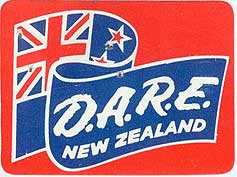
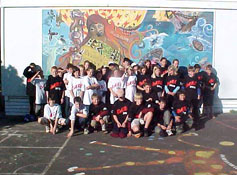
New Zealand Steel partners with local police to deliver community youth programs.
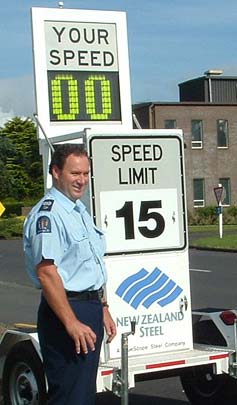
Watching your speed.
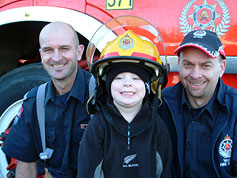
One of the initiatives New Zealand Steel embarked on to share our safety success with the community was a donation to the Waiuku Volunteer Fire Brigade.
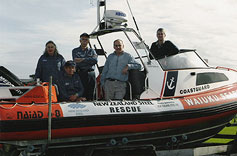
Rescue boat and safe boating program sponsored.
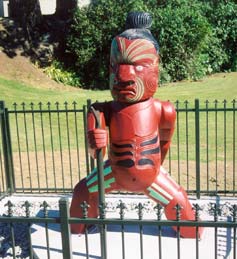
Tamakae, an impressive statue carved from swamp kauri logs.
